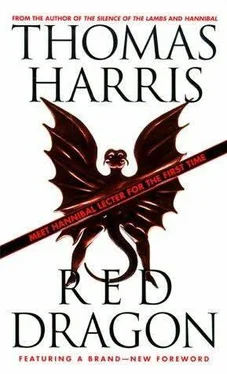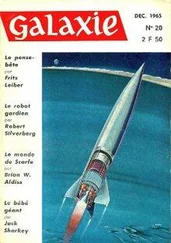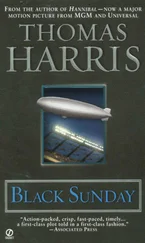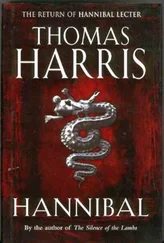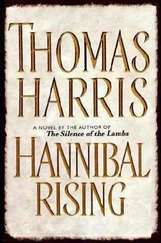He saw his mother once, at Grandmother's funeral in 1970. He looked through her, past her, with his yellow eyes so startlingly like her own. She might have been a stranger.
His appearance surprised his mother. He was deep-chested and sleek, with her fine coloring and a neat mustache which she suspected was hair transplanted from his head.
She called him once in the next week and heard the receiver slowly replaced.
# # #
For nine years after Grandmother's death Dolarhyde was untroubled and he troubled no one. His forehead was as smooth as a seed. He knew that he was waiting. For what, he didn't know.
One small event, which occurs to everyone, told the seed in his skull it was Time: standing by a north window, examining some film, he noticed aging in his hands. It was as though his hands, holding the film, had suddenly appeared before him and he saw in that good north light that the skin had slackened over the bones and tendons and his hands were creased in diamonds as small as lizard scales.
As he turned them in the light, an intense odor of cabbage and stewed tomatoes washed over him. He shivered though the room was warm. That evening he worked out harder than usual.
A full-length mirror was mounted on the wall of Dolarhyde's attic gym beside his barbells and weight bench. It was the only mirror hanging in his house, and he could admire his body in it comfortably because he always worked out in a mask.
He examined himself carefully while his muscles were pumped up.
At forty, he could have competed successfully in regional body-building competition. He was not satisfied.
Within the week he came upon the Blake painting. It seized him instantly.
He saw it in a large, full-color photograph in Time magazine illustrating a report on the Blake retrospective at the Tate Museum in London. The Brooklyn Museum had sent The Great Red Dragon and the Woman Clothed with the Sun to London for the show.
Time's critic said: "Few demonic images in Western art radiate such a nightmarish charge of sexual energy…" Dolarhyde didn't have to read the text to find that out.
He carried the picture with him for days, photographed and enlarged it in the darkroom late at night. He was agitated much of the time. He posted the painting beside his mirror in the weight room and stared at it while he pumped. He could sleep only when he had worked out to exhaustion and watched his medical films to aid him in sexual relief.
He had known since the age of nine that essentially he was alone and that he would always be alone, a conclusion more common to the forties.
Now, in his forties, he was seized by a fantasy life with the brilliance and freshness and immediacy of childhood. It took him a step beyond Alone.
At a time when other men first see and fear their isolation, Dolarhyde's became understandable to him: he was alone because he was Unique. With the fervor of conversion he saw that if he worked at it, if he followed the true urges he had kept down for so long-cultivated them as the inspirations they truly were – he could Become.
The Dragon's face is not visible in the painting, but increasingly Dolarhyde came to know how it looked.
Watching his medical films in the parlor, pumped up from lifting, he stretched his jaw wide to hold in Grandmother's teeth. They did not fit his distorted gums and his jaw cramped quickly.
He worked on his jaw in private moments, biting on a hard rubber block until the muscles stood out in his cheeks like walnuts.
In the fall of 1979, Francis Dolarhyde withdrew part of his considerable savings and took a three-month leave of absence from Gateway. He went to Hong Kong and he took with him his grandmother's teeth.
When he returned, red-haired Eileen and his other fellow workers agreed that the vacation had done him good. He was calm. They hardly noticed that he never used the employees' locker room or shower anymore – he had never done that often anyway.
His grandmother's teeth were back in the glass beside her bed. His own new ones were locked in his desk upstairs.
If Eileen could have seen him before his mirror, teeth in place, new tattoo brilliant in the harsh gym light, she would have screamed. Once.
There was time now; he did not have to hurry now. He had forever. It was five months before he selected the Jacobis.
The Jacobis were the first to help him, the first to lift him into the Glory of his Becoming. The Jacobis were better than anything, better than anything he ever knew.
Until the Leedses.
And now, as he grew in strength and Glory, there were the Shermans to come and the new intimacy of infrared. Most promising.
Francis Dolarhyde had to leave his own territory at Gateway Film Processing to get what he needed.
Dolarhyde was production chief of Gateway's largest division – home-movie processing – but there were four other divisions.
The recessions of the 1970's cut deeply into home moviemaking, and there was increasing competition from home video recorders. Gateway had to diversify.
The company added departments which transferred film to video-tape, printed aerial survey maps, and offered custom services to small-format commercial filmmakers.
In 1979 a plum fell to Gateway. The company contracted jointly with the Department of Defense and the Department of Energy to develop and test new emulsions for infrared photography.
The Department of Energy wanted sensitive infrared film for its heat-conservation studies. Defense wanted it for night reconnaissance.
Gateway bought a small company next door, Baeder Chemical, in late 1979 and set up the project there.
Dolarhyde walked across to Baeder on his lunch hour under a scrubbed blue sky, carefully avoiding the reflecting puddles on the asphalt, Lounds's death had put him in an excellent humor.
Everyone at Baeder seemed to be out for lunch.
He found the door he wanted at the end of a labyrinth of halls. The sign beside the door said "Infrared Sensitive Materials in Use. NO Safelights, NO Smoking, NO hot beverages." The red light was on above the sign.
Dolarhyde pushed a button and, in a moment, the light turned green. He entered the light trap and rapped on the inner door.
"Come." A woman's voice. Cool, absolute darkness. The gurgle of water, the familiar smell of D-76 developer, and a trace of perfume.
"I'm Francis Dolarhyde. I came about the dryer."
"Oh, good. Excuse me, my mouth's full. I was just finishing lunch."
He heard papers wadded and dropped in a wastebasket.
"Actually, Ferguson wanted the dryer," said the voice in the dark.
"He's on vacation, but I know where it goes. You have one over at Gateway?"
"I have two. One is larger. He didn't say how much room he has." Dolarhyde had seen a memo about the dryer problem weeks ago.
"I'll show you, if you don't mind a short wait."
"All right."
"Put your back against the door" – her voice took on a touch of the lecturer's practiced tone – "come forward three steps, until you feel the tile under your feet, and there'll be a stool just to your left."
He found it. He was closer to her now. He could hear the rustle of her lab apron.
"Thanks for coming down," she said. Her voice was clear, with a faint ring of iron in it. "You're head of processing over in the big building, right?"
"Um-humm."
"The same 'Mr. D.' who sends the rockets when the requisitions are filed wrong?"
"The very one."
"I'm Reba McClane. Hope there's nothing wrong over here."
"Not my project anymore. I just planned the darkroom construction when we bought this place. I haven't been over here in six months." A long speech for him, easier in the dark.
"Just a minute more and we'll get you some light. Do you need a tape measure?"
Читать дальше
